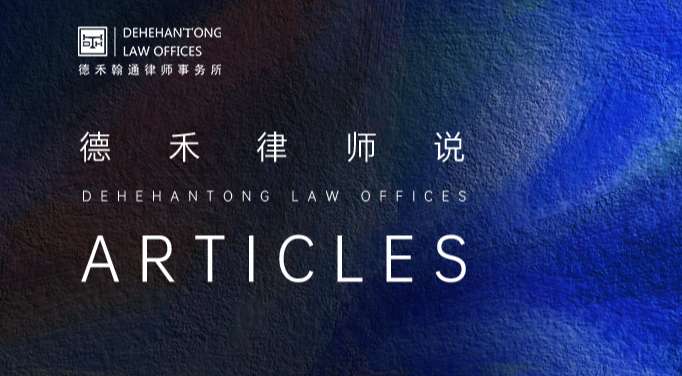From grass soft text to data brush volume, analysis of key regulation problems of current network marketing business
With the acceleration of digital transformation, online brand marketing has become one of the key ways for enterprises to gain competitive advantage. On September 1, 2024, the "Interim Provisions on Anti-Unfair Competition on the Network" (hereinafter referred to as the "Interim Provisions") promulgated by the State Administration of Market Supervision was officially implemented, which made a relatively comprehensive combing and regulation of unfair competition on the network, especially the new type of unfair competition on the network.
China's relevant provisions for unfair competition on the network are mainly reflected in the current "Anti-Unfair Competition Law" article 12, also known as the "Internet article", respectively stipulates traffic hijacking, malicious interference and malicious incompatibility of three types of unfair competition on the Internet, and set up a backstop clause. However, with the increasing number of unfair competition behaviors in cyberspace, in practice, relevant behaviors include not only the evolution and extension of traditional unfair competition behaviors, but also the unique form of implementation on network platforms by advanced technological means. The existing laws and regulations are ineffective in dealing with new types of unfair competition on the network due to their relatively lagging and limited coverage. The introduction of the "Interim Provisions" has provided more specific guidance for regulating the network market environment, clarified the definition criteria for a variety of new types of unfair competition on the network, and enhanced the operability of the law.
This paper analyzes three aspects of compliance risks involved in online brand marketing business, including false or misleading commercial advertising behavior (hereinafter referred to as "false advertising behavior"), reverse brushing behavior and interference with search engine algorithms. This paper aims to analyze these three types of behaviors under the framework of the Provisional Provisions and the revised Anti-Unfair Competition Law, to help relevant enterprises identify potential legal risks, and to provide compliance recommendations.
1. False propaganda through the Internet
1. Main legal framework for regulating false publicity
The Anti-Unfair Competition Law, the Advertising Law, the E-commerce Law and the Consumer Rights and Interests Protection Law all provide provisions on the regulation of false publicity, and the Measures for the Supervision and Administration of Online Transactions (hereinafter referred to as the Administrative Measures) and the Interim Provisions, as departmental rules, have detailed the provisions on false publicity in the above Law.
(1) Different laws and regulations have different subjects to regulate false publicity
The Administrative Measures and the Interim Provisions further clarify the definition of specific types of false publicity in the network environment and their legal responsibilities. The former focuses on regulating operators who carry out online trading activities, including platform operators and operators within platforms, while the latter is not limited to regulating operators who carry out transactions through the network. It is a code of conduct for all operators engaged in production and business activities through the Internet.
(2) The similarities and differences between "false advertising" and "false propaganda"
In law enforcement practice, there is often a problem of whether a certain kind of propaganda should be identified as false propaganda or false advertising. How to distinguish false propaganda from false advertising is the key to determine the applicable law. According to the "Interpretation of the Anti-Unfair Competition Law of the People's Republic of China" published by the China Democratic and Legal Press, "the particularity of commercial advertising compared with other commercial publicity lies in that advertising must be carried out through certain media and forms. For example, publicity through radio, television, newspapers, periodicals, printed matter, telephone, Internet, outdoor advertising and other media and forms, belongs to commercial advertising; In addition to commercial advertising, it is commercial publicity in the form of demonstration and explanation of products in the business premises, door-to-door sales, and holding publicity meetings and promotion meetings."
According to the above legal provisions and authoritative interpretations, false advertising is a specific form of false publicity. The difference between the two is that false advertising refers to false information published in advertising activities, while advertising is a specific behavior implemented through a specific medium limited by law, that is, Article 2 of the Advertising Administration Regulations stipulates: "All advertisements published, broadcast, installed or posted within the territory of the People's Republic of China through newspapers, newspapers, radio, television, films, street signs, window displays, printed materials, neon lights and other media or forms shall fall within the scope of the administration of these Regulations"; In contrast, the scope of false propaganda is broader, covering all types of commercial propaganda behavior, not limited to advertising forms. Whether it is false advertising behavior or false publicity behavior, both must have the characteristics of causing misunderstanding among the relevant public.
2. Interpretation of the provisions of the Provisional Provisions on false publicity
(1) Protection object extension:
From "consumer" to "consumer or related public"
In addition to the list of new types of network misconduct, both Articles 8 and 9 of the Provisional Provisions clearly refer to the "relevant public" as the object of deception and misdirection in their first paragraph. On December 25, 2024, the official website of the Standing Committee of the National People's Congress published the Anti-Unfair Competition Law (revised draft) (hereinafter referred to as the "Anti-Law draft") for public comment. In this "Anti-law draft", the object of deceptive and misleading acts regulated by false publicity provisions is also expanded from "consumers" to include "other operators". It provides the basis for the application of false propaganda clause in B2B scenario. For example, the practice of deceiving or misleading other operators to join a particular brand through false advertising may be regarded as false advertising.
(2) Specific types of false propaganda behavior:
Can be divided into "fictional" and "misleading"
Article 8 and Article 9 of the Provisional Provisions correspond to the false publicity in Article 8 of the Anti-Unfair Competition Law, and define and regulate the false or misleading commercial publicity in the network environment in detail through detailed enumeration and disclosure.
Article 8 A business operator shall not, by any of the following means, make false or misleading commercial publicity about commodity producers and business operators, as well as commodity properties, functions, quality, sources, honors, qualifications, etc., to deceive or mislead consumers or the relevant public:
(1) Display, demonstration, explanation, explanation, promotion or text annotation through websites, clients, mini programs, public accounts, etc.;
(2) Implement commercial marketing activities through live broadcasting, platform recommendation, online copywriting, etc.;
(3) Implement commercial marketing activities through hot search, hot review, hot transfer, list, etc.;
(4) other false or misleading commercial publicity.
Business operators shall not assist other business operators in carrying out the false or misleading commercial publicity acts mentioned in the preceding paragraph.
Among them, Article 8 mainly targets the publicity behavior of the commodity itself, that is, the display, demonstration, explanation, explanation, promotion or text annotation of the commodity carried out by the operator through various network channels (such as websites, mobile applications, mini programs, social media platforms, etc.); Article 9 is aimed at the publicity of the sales status of commodities, especially the behavior involving fictitious sales data, such as false transactions, false rankings, fictitious transaction volume, volume of reservations, and other data information related to business, and the use of false spot, fictitious reservations, and false panic buying for marketing. Fabricating user reviews or using misleading display to hide bad reviews, placing positive reviews first and bad reviews later, and not significantly distinguishing the evaluations of different products basically list the typical propaganda unfair competition behavior at present.
Article 9 Business operators shall not carry out the following acts to make false or misleading commercial publicity to commodity producers and business operators, commodity sales conditions, transaction information, business data, user evaluations, etc., to deceive or mislead consumers or the relevant public:
(1) False transactions and false rankings;
(2) Fictitious transaction volume, turnover, reservation volume and other data and information related to business;
(3) marketing by falsely claiming spot goods, making fictitious reservations, or making false purchases;
(4) fabricating user reviews, or using misleading display and other ways to hide bad reviews, placing positive reviews first and bad reviews later, and not significantly distinguishing reviews of different products;
(5) Using cash rebates, red envelopes, card coupons and other ways to entice users to make designated praise, "like", directional voting and other interactive behaviors;
(6) traffic data such as the number of fictitious favorites, clicks, attention, likes, reads, subscriptions, and forwards;
(7) Fictitious interactive data such as votes, listening, viewing, playing, box office, and audience rating;
(8) Fictitious education and training effects such as enrollment rates, passing rates, and employment rates;
(9) Marketing by falsifying word-of-mouth, fabricating topics, creating false hot spots of public opinion, and fabricating the income of network employees;
(10) Other false or misleading commercial publicity activities.
Business operators shall not help other business operators to carry out the false or misleading commercial publicity acts mentioned in the preceding paragraph by organizing false transactions, organizing false rankings, etc.
The author divides the false propaganda listed in Article 9 of the Provisional Provisions into two categories: "fictional" and "misleading". "Fictitious" improper commercial publicity refers to the existence of fictitious information, "fictitious" publicity, such as fictitious transactions, fictitious business data, fabricated evaluation, etc. "Misleading" improper commercial publicity refers to the publicity behavior that although there may be no fictional situation, but the situation of the product or service is not fully presented, which is enough to lead to consumer misunderstanding, such as misleading display evaluation (hiding bad reviews, positive reviews, etc.), and enticing users to make designated positive reviews.
3. Relevant cases
Since the number of administrative penalty decisions made in accordance with the "Interim Provisions" after the promulsion of the "Interim Provisions" is small, the reference value is limited, so the author summarizes some administrative penalty cases that although the penalty time is before the "Interim Provisions" but comply with the behaviors listed in article 9 of the "Interim Provisions" for reference:
Typical cases of "fictional" propaganda behavior:
False trading, fictitious trading data (Case No. : Shanghai Securities Regulatory Office (2024) 142024005776)
A biotechnology company in Shanghai carried out fake transactions through two kinds of swipe modes, including providing product coupons, inviting the swipe personnel to enter the online store to order the goods that need to be brushed and immediately applying for a refund, or transferring the order fee to the swipe personnel in advance before placing the order; Before placing the order, the price of the product will be greatly increased, so that the brushing personnel can use the "relatives and friends pay" function when placing the order, and the company will actually pay the order cost. The company involved 47 brush orders totalling $337,476.2 and was fined $40,000 for constituting false publicity.
Fabricating user evaluation (Case No. : Zhoupushan Municipal Supervision Punishment (2024) No. 153)
A hotel in Zhoushan City has been fined 10,000 yuan for false publicity for using consumers' mobile phones to give five-star reviews of hotel rooms and comment on "good stay experience" without actually checking in.
Fictitious transaction, Fictitious user evaluation (Case No. : Shanghai Securities Regulatory Office (2024) 122023009372)
A company in Shanghai commissioned a cultural communication company to publish 50 graphic promotion, the content provided by a company, after the cultural communication company review, through the small red book master account and simulation of ordinary users published, not written by actual users. A company in Shanghai was fined 10,000 yuan for these actions, which constituted false publicity.
Fictitious traffic data, interactive data (Case No. : Shanghai Regulatory Yang Office (2024) 102024001595)
A cultural communication company in Shanghai commissioned a brush company to add false speculation data to the project notes on a platform, including 2,729 fake likes, 1,508 collections, 80 comments, and 450 powder), which constituted false propaganda and was fined 50,000 yuan.
Fake word of mouth, processing topics (Case number: Jingtong City Supervision Punishment (2023) 2068)
A company in Beijing entrusted another party in Baidu Q&A, post bar and other places to publish about a certain liquor Q&A word-of-mouth marketing. The user evaluation promotion included the user experience such as the taste of the liquor, but the word-of-mouth marketing participants were not the actual buyers of the liquor, which misled consumers and was fined 30,000 yuan.
Typical cases of "misleading" propaganda behavior:
Concealed Assessment (Case No. : Shanghai Municipal Supervision Office (2024) 152024003123)
A Shanghai network technology service Co., LTD. (an APP operator), through technical means, failed to display users' negative reviews of three products including Dior perfume on the APP platform, violating regulatory regulations, and was fined 25,000 yuan.
Does not significantly distinguish the evaluation of different commodities (Source: Market Supervision Bureau of Gaoyao District, Zhaoqing City, Guangdong Province announced a typical case of unfair competition in 2023)
A store in Zhaoqing City did not significantly distinguish the product evaluation of "a sauce" product of manufacturer A and "a sauce" product of manufacturer B when selling goods online, and there was an illegal act of misleading consumers and was fined.
Other misleading commercial publicity (misleading consumers to believe that they are real consumption experience) (Case No. : Shanghai Regulatory Office (2021) 072021000181)
An information technology company in Shanghai recruited talent to punch a card to the merchants of the public review (the cost is borne by the merchants, there is a real transaction), but the talent is required to post positive reviews according to the specified requirements, prohibit bad reviews, and modify reviews until they meet the requirements. Such acts constitute the organization of false publicity and are punishable by a fine of $50,000. In this case, the notes written by the store inspector not only cannot express the true feelings of the store, but also can easily be mistaken for the real experience of consumers, which will lead to misleading consumption choices of other consumers.
4. Compliance suggestions
(1) It is recommended that online brand marketing operators, when accepting commercial publicity entrusted by customers, agree on the terms of compliance of the customer's commitment to publicity content in the contract;
(2) It is recommended that online brand marketing operators avoid making comments in the voice of consumers without actual consumption or suggest marking "advertising" and other signs in prominent positions to avoid consumers misthinking it as real consumption evaluation.
Second, reverse brushing behavior
Network transaction brushing can be divided into positive and reverse brushing, positive brushing refers to fictitious transactions to increase the sales of "own products", increase the praise to deceive consumers. Reverse brushing refers to the use of platform mechanisms to combat competitors through malicious batch operations.
1. The regulatory provisions of "reverse brushing" : Article 16 of the "Provisional Provisions" and Article 13 of the "Anti-Law Draft"
Article 16 A business operator shall not use technical means, directly, organize or through a third party, to carry out the following acts to hinder or destroy the normal operation of network products or services lawfully provided by other business operators:
(A) deliberately in a short period of time with other business operators large-scale, high-frequency transactions, or give praise, so that other business operators are subject to search downgrade rights, lower credit ratings, commodity removal, disconnection, stop services, etc.;
(2) maliciously snapping commodities in bulk in a short period of time without payment;
(3) Return goods or refuse to receive goods after malicious bulk purchase.
In addition, the regulation of the new network unfair competition in the "anti-law draft" is also worthy of attention. Article 13 of the Anti-Law draft submitted for deliberation adds "abuse of platform rules and implementation of malicious transactions" as one of the types of unfair competition acts on the Internet. From the perspective of text, reverse brushing, bulk returns and other behaviors can fall into the category of the aforementioned new behavior types. The expression of these clauses is highly general. If these clauses are formally introduced, the author believes that these clauses give law enforcement agencies a certain discretion, and at the same time, it also puts forward a test for law enforcement agencies to accurately judge malicious transactions.
2. Typical case of "reverse brushing behavior"
After the promulgation of the "Interim Provisions" has not been disclosed in accordance with article 16 (1) of the case of administrative punishment, the author sorted out some of the "Interim Measures" before the promulgation of the type of behavior in line with the above provisions of the case, for reference:
In order to crack down on competitors, enterprises buy products with malicious reviews (source: Heilongjiang Suihua City Market Supervision Administration public number article "City law Statement" "Interim Provisions on the Network against Unfair Competition" heavy
Recommended Information
-
ArticlesShanghai data exit negative list latest interpretation2025-02-11
-
ArticlesAnalysis of DeepSeek equity structure2025-02-08
-
Case StudiesDehehantong helped the state-owned financial asset management company successfully acquire 313 million yuan non-performing assets package project2025-02-06
-
ArticlesThe arbitration view that lasted 16 years may have a major change, Shanghai employers lose the option of open-ended labor contracts?2025-01-21
-
ArticlesRelated legal interpretation and risk tips on "Implementing gradual delay of statutory retirement age"2025-01-17















